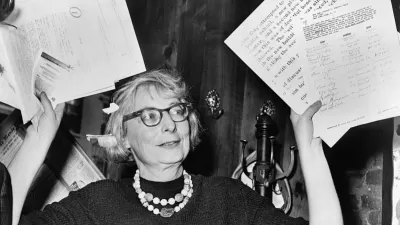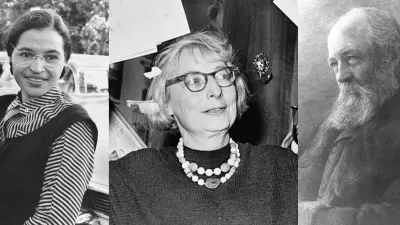The world has changed since Planetizen crowdsourced its "Top Urban Thinkers" in 2009. Which urban planners, designers, doers, and dreamers do you think have had the most influence on the world?

[Update: Voting is complete, and the 100 Most Influential Urbanists are available for viewing.]
Planetizen is rebooting the "Top Thinkers" crowdsourcing experiment last conducted in 2009. This time, however, we're broadening the discussion to survey our audience on their opinion of the "Most Influential Urbanists." Urbanists are more than just thinkers—they're designers, doers, advocates, contrarians, and, yes, planners.
We invite you to think radically about your nominations. Environmentalists and musicians are two examples of the kind of non-traditional urbanists who perhaps should be included on this list. Outsiders, artists, and citizens going about their daily lives have certainly had tremendous influence on the way we think about cities and how cities are developed, and their contributions should be recognized. An exemplary nominee might have contributed to the future of cities by choosing a better seat on the bus (like Rosa Parks did), or inventing the term "gentrification" (like Ruth Glass did).
When Planetizen last published the "Top Thinkers" list in 2009, Jane Jacobs ran away with the vote, but women and people of color were largely unrecognized through the nominations and voting process. We hope that this time around we can do a better collective job of representing the diversity of the field, its history, and the communities where we all live and work.
If you have nominations, please send an email to [email protected], with the subject line "Influential Urbanists." Also feel free to join the discussion with @planetizen and by using the #topurbanist hashtag on Twitter. We'll release the official results of the "Most Influential Urbanists" poll, and let the voting commence, during the first week of September.


Alabama: Trump Terminates Settlements for Black Communities Harmed By Raw Sewage
Trump deemed the landmark civil rights agreement “illegal DEI and environmental justice policy.”

Planetizen Federal Action Tracker
A weekly monitor of how Trump’s orders and actions are impacting planners and planning in America.

Why Should We Subsidize Public Transportation?
Many public transit agencies face financial stress due to rising costs, declining fare revenue, and declining subsidies. Transit advocates must provide a strong business case for increasing public transit funding.

Understanding Road Diets
An explainer from Momentum highlights the advantages of reducing vehicle lanes in favor of more bike, transit, and pedestrian infrastructure.

New California Law Regulates Warehouse Pollution
A new law tightens building and emissions regulations for large distribution warehouses to mitigate air pollution and traffic in surrounding communities.

Phoenix Announces Opening Date for Light Rail Extension
The South Central extension will connect South Phoenix to downtown and other major hubs starting on June 7.
Urban Design for Planners 1: Software Tools
This six-course series explores essential urban design concepts using open source software and equips planners with the tools they need to participate fully in the urban design process.
Planning for Universal Design
Learn the tools for implementing Universal Design in planning regulations.
Caltrans
Smith Gee Studio
Institute for Housing and Urban Development Studies (IHS)
City of Grandview
Harvard GSD Executive Education
Toledo-Lucas County Plan Commissions
Salt Lake City
NYU Wagner Graduate School of Public Service




























